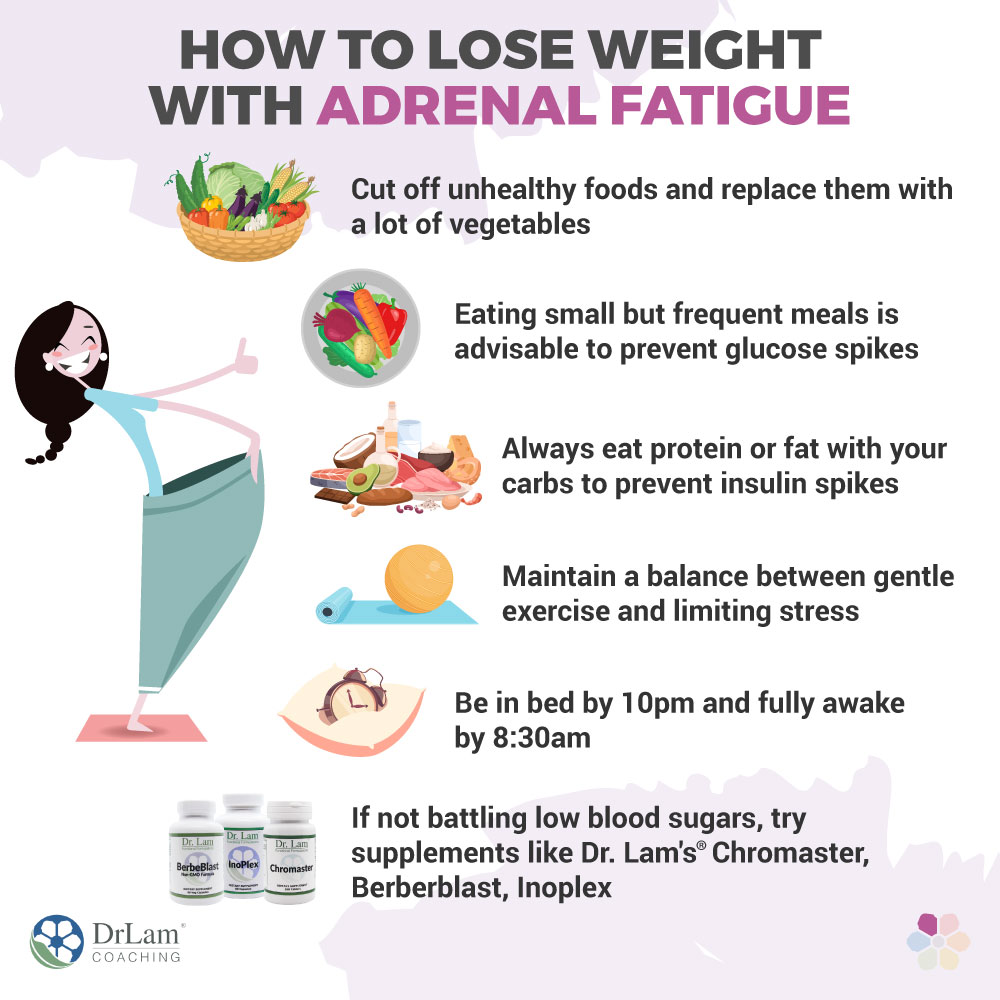One of the worst feelings in the world is embarking on a weight loss journey, devoting time and energy to it, and still having no results to show for it. Such instances may be because the underlying cause of the weight gain has not been addressed. There are many causes of weight gain, and adrenal fatigue is one of them. This article will examine the right steps for tackling adrenal fatigue for weight loss.
Adrenal Fatigue Syndrome (AFS) is the non-Addison’s form of adrenal dysfunction, where the body’s stress response cannot keep up with life’s chronic stressors. Many symptoms are associated with adrenal fatigue, and weight change is among them. Below is an examination of the relationship between adrenal fatigue and weight changes.
 Weight gain is one of the most common symptoms of adrenal fatigue, especially around the abdomen. Furthermore, the attendant weight gain with adrenal fatigue is difficult to lose, even with the normal weight loss strategies many people have successfully implemented. The difficulty in losing weight among people suffering from adrenal fatigue is linked to the physiology of adrenal fatigue.
Weight gain is one of the most common symptoms of adrenal fatigue, especially around the abdomen. Furthermore, the attendant weight gain with adrenal fatigue is difficult to lose, even with the normal weight loss strategies many people have successfully implemented. The difficulty in losing weight among people suffering from adrenal fatigue is linked to the physiology of adrenal fatigue.
The body faces stress every day. This includes work-related stress, school-related stress, air pollution, illness, exercise, food contamination, etc. Fortunately, the body has an effective system for managing the stress it encounters, and this system is known as the NeuroEndoMetabolic (NEM) Stress Response.
The NEM response is an interconnected system of six circuits that includes different body organs. These circuits work together to help the body adapt to stress. Naturally, when the body undergoes stress, the hypothalamus is stimulated and releases corticotropin-releasing hormone (CRH). This hormone then prompts the pituitary gland to release adrenocorticotropic hormone (ACTH), which then stimulates the adrenal glands to release cortisol.
Cortisol plays a major role in managing stress, and it is often referred to as the body’s stress hormone. After cortisol helps neutralizes the stressor, the hypothalamus stimulates the adrenal glands to stop its (cortisol) production. This hormone cascade is referred to as the hypothalamic-pituitary-adrenal (HPA) axis, and it keeps the cortisol level in the body in check.
However, if the body is chronically stressed, the adrenal glands have to keep producing cortisol. If this overworking of the adrenal glands persists, adrenal fatigue may result. Since cortisol increases appetite and overeating, overproduction of the hormone can cause weight gain.1
While the relationship between adrenal fatigue and weight gain is straightforward – adrenal fatigue is associated with higher cortisol levels, which increases appetite and overeating, eventually leading to weight gain – the relationship between AFS and weight loss is not as clear cut.
When the adrenal glands are overworked for extended periods, the cortisol they produce progressively reduces. Eventually, the cortisol levels in the body may become below the optimal level, resulting in reduced appetite and weight loss. However, weight loss is not common among people suffering from adrenal fatigue.
Weight gain is common with adrenal fatigue, but beyond just weight gain, it is important to note that the waist region is the most affected by weight gain. The reason for this is not just cortisol but also insulin, which stimulates body cells to absorb glucose from the blood. Since cortisol promotes overeating, insulin production often accompanies high cortisol levels.
Aside from increasing appetite, cortisol also activates glucocorticoid receptors, which are densely concentrated in visceral fat depots. When insulin is present, cortisol promotes the storage of triglycerides in visceral adipose tissue resulting in increased abdominal fat.2 This increase in abdominal fat is associated with increased waist circumference among people with adrenal fatigue.

There are different weight loss programs circulating in society today. Some of them are useful, while others can even be harmful. When losing weight, it is essential to consider your health condition and needs, and streamline your weight loss program to that condition. With that said, here are strategies for tackling adrenal fatigue for weight loss.
 Like a polar bear doesn't want to lose weight in the winter when it's stressed, so it's the same with our bodies. When it's under stress, your fight or flight sympathetic nervous system focuses on survival and storing up reserves. It doesn't want to burn off the calories just in case it needs it for the future. The only way to start losing weight is to be able to get rid of the stress, balance the hormones, then the body will be comfortable losing weight.
Like a polar bear doesn't want to lose weight in the winter when it's stressed, so it's the same with our bodies. When it's under stress, your fight or flight sympathetic nervous system focuses on survival and storing up reserves. It doesn't want to burn off the calories just in case it needs it for the future. The only way to start losing weight is to be able to get rid of the stress, balance the hormones, then the body will be comfortable losing weight.
Research indicates that energy deficit is the only determinant for fat loss in the body.3 Attaining a negative energy balance is synonymous with adopting a mechanism that reduces the body’s calories. This can occur in two main ways: reducing calorie intake while keeping calorie expenditure constant or reducing calorie expenditure while keeping calorie intake constant.
However, it is essential to be careful when maintaining a calorie deficit with adrenal fatigue. This is because adopting the wrong approach can worsen the condition. A good strategy to adopt is to cut off unhealthy foods and replace them with a lot of vegetables and roughages while slowly increasing calorie deficit with moderate exercise. You have to listen to your body and feed it if it is hungry during adrenal fatigue.
Mentioning calorie deficit without mentioning meal plans and meal timing is impossible when addressing weight loss in people with adrenal fatigue. Most people believe cutting the amount of food they eat is the only important factor when cutting weight. However, only eating less can deplete nutrient levels and end up causing even more problems.
To burn fat the right way and still be healthy, you need to eat nutritious meals and snacks. Also, these meals have to be spread across the day. Eating small but frequent meals is advisable to prevent glucose spikes. Always eat protein or fat with your carbs to preven those insulin spikes.
Exercise helps to relieve stress and improve adrenal fatigue recovery and oxygenation. Also, it is a good way to raise mood, improve blood circulation, balance blood glucose, and maintain important hormonal balances. As it relates to weight loss in adrenal fatigue, exercise can help balance cortisol levels in the body, which can help with weight loss. Also, exercise is important for maintaining a calorie deficit in the body, which is the most fundamental weight loss strategy.
There are various strategies for exercising with adrenal fatigue. First, begin gently. In advanced cases of adrenal fatigue, begin with adrenal breathing exercises before adrenal restorative exercises. High-intensity exercises increase cortisol levels, which can lead to adrenal crashes for some people. Hence, consider mild activities like yoga and walking.
For people with adrenal fatigue, it is crucial to maintain a balance between exercise and limiting stress. While exercise is useful, it is worth noting that intense exercise can actually stress the body. Hence, it is key to stick to moderate exercise for people suffering from adrenal fatigue.
Once there is an improvement in adrenal fatigue, include aerobic exercises like swimming and running and anaerobic ones like squats and weight lifting. Other alternatives include flexibility exercises like tai chi and yoga. Regardless of the form of exercise you choose, create an optimum recovery period between sessions.
 Sleep is a key player in adrenal recovery and overall well-being. Ordinarily, if you’re tackling adrenal fatigue, you should be in your bed no later than 10 p.m. and be fully awake around 8:30 a.m. This is important to avoid waking in periods when cortisol levels in the body are at its highest.
Sleep is a key player in adrenal recovery and overall well-being. Ordinarily, if you’re tackling adrenal fatigue, you should be in your bed no later than 10 p.m. and be fully awake around 8:30 a.m. This is important to avoid waking in periods when cortisol levels in the body are at its highest.
Studies have also revealed a relationship between poor sleep quality and HPA activation, which usually results in cortisol production.4 The same also applies to sleep deprivation. Lack of sleep has also been connected to surprising levels of weight gain and increased hunger.
Supplementation can also help increase the nutrient levels in the body. However, supplements can also be detrimental if they are not the right ones. Useful supplements for managing adrenal fatigue include Vitamin C, Vitamin B5, magnesium, Vitamin E, holy basil, ashwagandha root, and glutathione, but be sure to talk to a doctor aware of AFS first. A useful supplement for sugar cravings is Dr. Lam's Chromaster, which contains chromium, great for balancing sugars and helping with weight loss. Berberine is another supplement that can improve weight loss.
When tackling adrenal fatigue for weight loss, the foods you avoid are as important as the foods you eat. Below are some foods to avoid eating if you are trying to lose weight with adrenal fatigue.
Avoid all forms of processed food when tackling weight loss with adrenal fatigue. Processed foods are simply foods that have changed from their natural state. While there are a few healthy processed foods, distinguishing between healthy and unhealthy ones is difficult, and it is best to be on the safe side.
The primary cause of concern with processed foods are the added chemicals, unhealthy fats, simple sugars, and sodium. All of these can reduce already-low nutrient levels even more. Also, unhealthy fats can directly cause weight gain by accumulating in the body and visceral region.
Foods and drinks that can act as stimulants in the body are generally unsafe when trying to lose weight with adrenal fatigue. These foods and drinks include coffee and tea. When they enter the body, they have the propensity to increase the production of cortisol, which can cause weight gain. Also, stimulants interfere with normal sleep in the body, which can further increase stress.
Foods like pizza, bread, cake, and pasta contain gluten, contributing to their high consumption in society today. Gluten is a type of protein in many grains, like wheat, rye, and barley. Many people limit gluten in their diet because it does not provide essential nutrients to the body.
However, for people with adrenal fatigue, eliminating gluten is more of a necessity than a luxury. This is because studies show that individuals who cut gluten entirely from their diet have lower cortisol levels than those who do not.5 Considering the relationship between cortisol and weight gain, it goes without saying that any food that can cause spikes in cortisol levels should be avoided by people with adrenal fatigue.
 People suffering from adrenal fatigue may have hormone imbalances, especially if there is dysregulation of the hormone circuit of the NEM. This is also the case among individuals who record weight loss with adrenal fatigue. The obvious solution to these imbalances seems to be hormone replacement, but it is not always helpful.
People suffering from adrenal fatigue may have hormone imbalances, especially if there is dysregulation of the hormone circuit of the NEM. This is also the case among individuals who record weight loss with adrenal fatigue. The obvious solution to these imbalances seems to be hormone replacement, but it is not always helpful.
While using hormones may replenish the body’s hormone levels, they do not address the underlying cause of the hormone deficiency. This means that hormone therapy may mask the adrenal fatigue condition, and it can worsen over time as the individual does not pay attention to managing it.
There are different management approaches to adrenal fatigue, but reducing stressors is the fastest and most important. This is unsurprising, as the cause of adrenal fatigue in the first place is chronic stress.
Below are common ways to reduce stressors:
Adrenal fatigue arises when the body cannot cope with chronic life stressors. One of the symptoms of adrenal fatigue is weight gain, which occurs due to the overproduction of cortisol in the body. The steps to tackling adrenal fatigue for weight loss include maintaining a calorie deficit, proper diet, good meal planning and timing, gentle exercise, and adequate sleep.
Although these steps can help lose weight in the short term, it is important to start taking recovery measures for adrenal fatigue to prevent subsequent weight gain. Ensure you speak to health practitioners experienced in functional medicine about managing your adrenal fatigue.
For more information about tackling adrenal fatigue for weight loss, the team at Dr. Lam Coaching can help. We offer a free, no-obligation phone consultation at +1 (626) 571-1234 where we will privately discuss your symptoms and various options. You can also send us a question through our Ask The Doctor system by clicking here.
Epel E, Lapidus R, McEwen B, Brownell K. Stress may add bite to appetite in women: a laboratory study of stress-induced cortisol and eating behavior. Psychoneuroendocrinology. 2001 Jan;26(1):37-49. doi: 10.1016/s0306-4530(00)00035-4. PMID: 11070333. https://pubmed.ncbi.nlm.nih.gov/11070333/
Peckett AJ, Wright DC, Riddell MC. The effects of glucocorticoids on adipose tissue lipid metabolism. Metabolism 2011; 60: 1500– 1510. https://pubmed.ncbi.nlm.nih.gov/21864867/
Strasser B, Spreitzer A, Haber P. Fat loss depends on energy deficit only, independently of the method for weight loss. Ann Nutr Metab. 2007;51(5):428-32. doi: 10.1159/000111162. Epub 2007 Nov 20. PMID: 18025815. https://pubmed.ncbi.nlm.nih.gov/18025815/
Hirotsu C, Tufik S, Andersen ML. Interactions between sleep, stress, and metabolism: From physiological to pathological conditions. Sleep Sci. 2015 Nov;8(3):143-52. doi: 10.1016/j.slsci.2015.09.002. Epub 2015 Sep 28. PMID: 26779321; PMCID: PMC4688585. https://pubmed.ncbi.nlm.nih.gov/26779321/
Esposito S, Miconi F, Savarese E, et al. Physiologic hypercortisolism at onset of celiac disease in a girl: A case report. Medicine (Baltimore). 2018;97(36):e12160. https://pubmed.ncbi.nlm.nih.gov/30200115/
Yes, adrenal fatigue can cause weight loss. The weight loss results from decreased cortisol levels and reduced appetite when the adrenal glands are overworked for extended periods. But while weight loss can happen among people suffering from adrenal fatigue, it is not common. Most people gain weight while cortisol levels are high instead.
